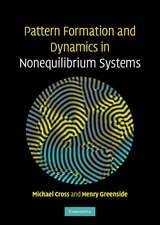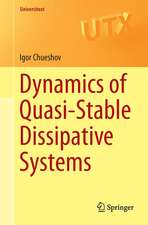Markov Chain Aggregation for Agent-Based Models: Understanding Complex Systems
Autor Sven Banischen Limba Engleză Hardback – 5 ian 2016
| Toate formatele și edițiile | Preț | Express |
|---|---|---|
| Paperback (1) | 495.18 lei 6-8 săpt. | |
| Springer International Publishing – 30 mar 2018 | 495.18 lei 6-8 săpt. | |
| Hardback (1) | 501.39 lei 6-8 săpt. | |
| Springer International Publishing – 5 ian 2016 | 501.39 lei 6-8 săpt. |
Din seria Understanding Complex Systems
- 18%
 Preț: 1112.30 lei
Preț: 1112.30 lei -
 Preț: 439.25 lei
Preț: 439.25 lei - 18%
 Preț: 1119.38 lei
Preț: 1119.38 lei - 15%
 Preț: 401.82 lei
Preț: 401.82 lei - 18%
 Preț: 1247.26 lei
Preț: 1247.26 lei - 15%
 Preț: 641.20 lei
Preț: 641.20 lei - 15%
 Preț: 642.68 lei
Preț: 642.68 lei - 15%
 Preț: 651.51 lei
Preț: 651.51 lei - 18%
 Preț: 946.55 lei
Preț: 946.55 lei - 18%
 Preț: 947.98 lei
Preț: 947.98 lei - 20%
 Preț: 650.27 lei
Preț: 650.27 lei - 18%
 Preț: 952.09 lei
Preț: 952.09 lei - 18%
 Preț: 957.13 lei
Preț: 957.13 lei - 18%
 Preț: 943.88 lei
Preț: 943.88 lei -
 Preț: 398.35 lei
Preț: 398.35 lei - 5%
 Preț: 1417.54 lei
Preț: 1417.54 lei - 15%
 Preț: 648.42 lei
Preț: 648.42 lei -
 Preț: 387.75 lei
Preț: 387.75 lei - 18%
 Preț: 1133.76 lei
Preț: 1133.76 lei - 18%
 Preț: 948.16 lei
Preț: 948.16 lei - 20%
 Preț: 655.85 lei
Preț: 655.85 lei - 18%
 Preț: 1113.09 lei
Preț: 1113.09 lei - 20%
 Preț: 655.53 lei
Preț: 655.53 lei - 15%
 Preț: 653.00 lei
Preț: 653.00 lei - 18%
 Preț: 1332.92 lei
Preț: 1332.92 lei - 18%
 Preț: 1010.48 lei
Preț: 1010.48 lei - 18%
 Preț: 955.56 lei
Preț: 955.56 lei -
 Preț: 384.22 lei
Preț: 384.22 lei - 18%
 Preț: 950.66 lei
Preț: 950.66 lei - 15%
 Preț: 638.43 lei
Preț: 638.43 lei - 15%
 Preț: 644.49 lei
Preț: 644.49 lei - 15%
 Preț: 647.40 lei
Preț: 647.40 lei - 15%
 Preț: 649.06 lei
Preț: 649.06 lei - 15%
 Preț: 639.25 lei
Preț: 639.25 lei - 15%
 Preț: 643.65 lei
Preț: 643.65 lei - 18%
 Preț: 960.78 lei
Preț: 960.78 lei - 15%
 Preț: 649.87 lei
Preț: 649.87 lei - 15%
 Preț: 645.47 lei
Preț: 645.47 lei
Preț: 501.39 lei
Preț vechi: 589.87 lei
-15% Nou
Puncte Express: 752
Preț estimativ în valută:
95.94€ • 102.59$ • 79.99£
95.94€ • 102.59$ • 79.99£
Carte tipărită la comandă
Livrare economică 18 aprilie-02 mai
Preluare comenzi: 021 569.72.76
Specificații
ISBN-13: 9783319248752
ISBN-10: 3319248758
Pagini: 170
Ilustrații: XIV, 195 p. 83 illus., 18 illus. in color.
Dimensiuni: 155 x 235 x 18 mm
Greutate: 0.48 kg
Ediția:1st ed. 2016
Editura: Springer International Publishing
Colecția Springer
Seria Understanding Complex Systems
Locul publicării:Cham, Switzerland
ISBN-10: 3319248758
Pagini: 170
Ilustrații: XIV, 195 p. 83 illus., 18 illus. in color.
Dimensiuni: 155 x 235 x 18 mm
Greutate: 0.48 kg
Ediția:1st ed. 2016
Editura: Springer International Publishing
Colecția Springer
Seria Understanding Complex Systems
Locul publicării:Cham, Switzerland
Public țintă
ResearchCuprins
Introduction.- Background and Concepts.- Agent-based Models as Markov Chains.- The Voter Model with Homogeneous Mixing.- From Network Symmetries to Markov Projections.- Application to the Contrarian Voter Model.- Information-Theoretic Measures for the Non-Markovian Case.- Overlapping Versus Non-Overlapping Generations.- Aggretion and Emergence: A Synthesis.- Conclusion.
Textul de pe ultima copertă
This self-contained text develops a Markov chain approach that makes the rigorous analysis of a class of microscopic models that specify the dynamics of complex systems at the individual level possible. It presents a general framework of aggregation in agent-based and related computational models, one which makes use of lumpability and information theory in order to link the micro and macro levels of observation. The starting point is a microscopic Markov chain description of the dynamical process in complete correspondence with the dynamical behavior of the agent-based model (ABM), which is obtained by considering the set of all possible agent configurations as the state space of a huge Markov chain. An explicit formal representation of a resulting “micro-chain” including microscopic transition rates is derived for a class of models by using the random mapping representation of a Markov process. The type of probability distribution used to implement the stochastic part of the model, which defines the updating rule and governs the dynamics at a Markovian level, plays a crucial part in the analysis of “voter-like” models used in population genetics, evolutionary game theory and social dynamics. The book demonstrates that the problem of aggregation in ABMs - and the lumpability conditions in particular - can be embedded into a more general framework that employs information theory in order to identify different levels and relevant scales in complex dynamical systems
Caracteristici
Introduces and describes a new approach for modelling certain types of complex dynamical systems Self-contained presentation and introductory level Useful as advanced text and as self-study guide Includes supplementary material: sn.pub/extras











